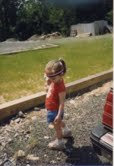It all began with snack gone awry. Several times, when we had yogurt or applesauce or something vaguely liquidy for snack, Mrs. B and I noticed that several cups ended up in the cup bin with a cloudy mixture in them: a sign that snack was being used to play and not to eat!
A lot of times, there's a knee-jerk reaction to something like this--children do something they're not "supposed" to do, and so we adults immediately forbid the inappropriate action. The problem with this reaction is, it might suppress the behavior, but it doesn't erase the desire to do whatever it is the children are doing, and often it leads to us being upset at them for finding ways to continue doing it.
In this case, clearly, the kids wanted to mix stuff.
Normally, we're not big proponents of using food for anything but eating at school--I know one of my own personal values is to waste as little as possible. But here, I don't consider it a waste to provide the children with an opportunity for scientific exploration. (Yes, I said it: mixing random food together is scientific exploration!)
Science is all about asking questions and conducting experiments to find answers. For three and four year olds, those questions are things like, "What happens if we mix bread with water?" and then of course we use our hands to mix the bread and the water together, to feel the changes in the texture. Then we ask again. "What happens if we add jelly to the bread and water?" And we mix and we feel the changes (and as several children noted, "My hands are all sticky!")

So far the children came up with a list of things they'd like to mix, and we've completed two concoctions. The recipes were as follows...
Concoction #1
bread
water
grape jelly
blue food coloring
mini marshmallows
green paint
purple paint
Concoction #2
soy sauce
duck sauce
hot mustard
bananas
mini marshmallows
We'll do another concoction this week, and we can start to point out patterns: marshmallows don't mix like the other stuff does, for example. Perhaps just as importantly, together we've turned what could have been an ongoing tension in the classroom--the children playing with their food and teachers getting frustrated--into an ongoing scientific inquiry that challenges the children to stretch their minds and allows them to really do some hands-on work!
Not a bad fate for all those ketchup packets, eh?

What a brilliant thought, that playing with your food is an early form of scientific experiment. Honestly, the stuff you say always sounds so obvious in retrospect but it's like a lightbulb going off at the time.
ReplyDeleteSomeday you're going to write a very successful book. Then I can say I knew you when...
i can't help but think: 'doesn't this just make them want to mix everything all the time?' i get that giving them space to do it in a controlled, purposeful way is supposed to curb the 'i'm gonna do it and hide it from you' aspect, but i would think they still just do it all the time, and waste their snack food as well as what goes into the experiment.
ReplyDeletealso, you should totally do that cornstarch-water liquid-solid thing with them if you haven't yet.
It's all about presentation: I took a few of the cloudy snack cups and put them in the middle of the rug at snack time. Then I asked a couple of questions to the kids - 'what cups are these?' (snack cups) 'what do we put in them?' (water) 'does this look like just water?' (nooooo). 'So something else has been mixed in, right? Do you like to mix things?" The kids say yes, and so then I can tell them, 'Ok, well then we can do some mixing at playtime. But we're not going to mix at snacktime anymore. Got it? Let's make a list of what things we'd like to mix together during playtime.'
ReplyDeleteWith little ones especially, it's all about reinforcement of acceptable channels for behavior. Their desire itself was fine and natural (mixing), but they needed to be presented with a framework for how to make the expression of that desire acceptable, since they mostly don't have the experience to know how to do it themselves. Ultimately, the vast majority of kids/people want to do the 'right' thing and sometimes just need to be shown a way to do it. :-)